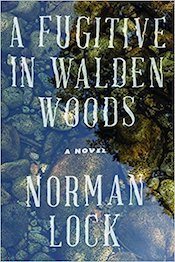Norman Lock has done his homework about Henry David Thoreau and slavery, capturing the essence of both in his sublime novel, A Fugitive in Walden Woods. What he has imagined is the existence of a Negro living in the woods near Walden Pond the same year, 1845-1946, that Thoreau lived there, a fugitive slave he imbues with dignity, perception, even humor. Samuel Long has escaped slavery in Virginia, after a violent act of self-mutilation, and—because he is literate, something that was rare for slaves—Lock has enjoined him with the Transcendentalists of the era (Thoreau, Emerson, Hawthorne and Garrison), in part because of their stance on slavery.
Samuel’s owner kept him chained at night, believing that would prevent him from running away. But that assumption is negated in the opening pages of Lock’s novel where he provides his narrator’s description of how he chopped off one of his hands with an axe and then cauterized “the bloody stump into hot tar,” the maiming his badge of courage and freedom. Then the flight north that will be described in detail much later in the novel when Samuel tells his story to William Lloyd Garrison, who publishes it in The Liberator, thus including inside the outer story a mini-slave narrative that describes being shipped in an empty whisky cask from the South to the North—one stage along the Underground Railroad and one recorded in variants in slave narratives published during the era.
It is Ralph Waldo Emerson (in Lock’s story) who helps Samuel by employing him to watch over Thoreau from a distance, the year Thoreau embarks on his experiment of living at the pond. Samuel echoes Thoreau, when he states of his stay near the pond: “I wish to be reliant on no one  but myself.” And his invisibility is furthered when he remarks, “I am not mentioned in his account of his sojourn in Walden Woods. I was not important to his experiment. I might have spoiled the design of his story, “ i.e., Thoreau’s argument of self-reliance. Nevertheless, in this version at life at the pond, the two men become close friends, sometimes even taking trips together to neighboring areas. By the conclusion of the narrative, Samuel will have questioned his existence as a run-away Negro, as a free man, pondering some of the same fundamentals that Thoreau brought up in his narrative. It’s reasonable to say that the two men become doubles of one another. Late in the narrative, Samuel will state of Thoreau and himself, “We think too much.”
but myself.” And his invisibility is furthered when he remarks, “I am not mentioned in his account of his sojourn in Walden Woods. I was not important to his experiment. I might have spoiled the design of his story, “ i.e., Thoreau’s argument of self-reliance. Nevertheless, in this version at life at the pond, the two men become close friends, sometimes even taking trips together to neighboring areas. By the conclusion of the narrative, Samuel will have questioned his existence as a run-away Negro, as a free man, pondering some of the same fundamentals that Thoreau brought up in his narrative. It’s reasonable to say that the two men become doubles of one another. Late in the narrative, Samuel will state of Thoreau and himself, “We think too much.”
There are plenty of obstacles for Samuel to overcome in spite of his escape to the North. When he first meets William Lloyd Garrison, who wants to use him as an example, Samuel bristles at the
suggestion and informs us, “I would rather have been a miserable field slave than a pet nigger.’ Later, in the same context, he will observe, “A man gets tired of being the object of other people’s goodness.” Yet—in spite of his continual exposure to the great minds of the nineteenth century—Samuel will ponder his own reflective nature numerous times, including the following troubled observation: “My own existence seemed to have no point at all.”
Initially, I was uncomfortable with Samuel’s erudition, his constant references to literary works that he mentions he has read. There’s a difference between being literate and familiar with many
of the great works of Western literature. That problem is eventually clarified and nullified for me because although his story focuses on the year he spent near Walden Pond, Samuel explains that his later formal education and work for the abolitionist movement was when he was exposed to such literary texts. And, he informs us that his account of Henry David Thoreau was written almost twenty years later, after Thoreau’s death. We also learn that Emerson in time arranged for his manumission, in the spring of 1847. Because of the Fugitive Slave Law, slaves who had fled to the North were still likely to be captured and dragged back to the South. There “was no last stop on the Underground Railroad. There could be no safe haven.”
As if to drive that idea home, Lock includes one final startling incident in A Fugitive in Walden Woods. It solidifies the relationship between both men, yet it also brings about the end of their close juxtaposition in living quarters. It’s an amazing conclusion to the novel, the imaginary slave-narrative if you want to call it that, but a formidable gloss on what slavery meant to the Transcendentalists. Read it and you will appreciate Lock’s profound understanding of the troubled era (the nation’s greatest thinkers grappling with our country’s original sin while accepting in their presence a living example of that transgression), a powerful insight into our unresolved issue of race in the United States, something that may yet destroy us.
Norman Lock: A Fugitive in Walden Woods
Bellevue Literary Press, 240 pp., $16.99
Charles R. Larson is Emeritus Professor of Literature at American University in Washington, D.C. Email: clarson@american.edu. Twitter @LarsonChuck.